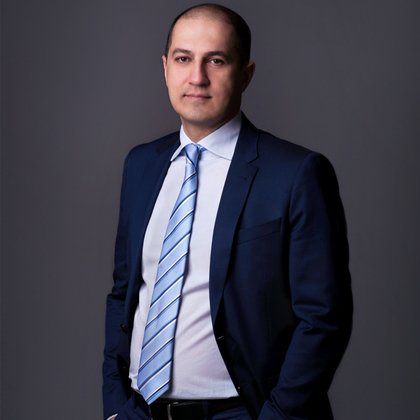The executive director of the National Law Company "Mitra" Zaurbek Akhmetov told about the legal difficulties faced by the enterprises of the fuel and energy sector.
Energy as a basic industry is an indicator of the level of development of any economy. The health of this branch largely depends on the state in the person of its legislative, executive and judicial bodies. About what lawyers in the energy sector are involved in and how the laws affect the industry, we talked with the executive director of the National Law Company “Mitra”, Zaurbek Akhmetov.
The fuel and energy sector is a very capacious area for legal support. What issues are the most acute for the energy companies of the region and how are they resolved?
- The main problem of enterprises of all enterprises of the fuel and energy complex has been non-payments for many years. In this case, I look at the legal side of the matter, since the avalanche-like growth of accounts receivable and payable of energy companies, which we have in the southern regions of the country, is largely due to the imperfection of legal regulation. For example, by the law, the majority of electricity consumers conduct settlements on a postpaid method, which implies payment after the month in which consumption occurred. If the consumer did not make the payment on time, the power supply company has a cash gap, because it has already overdue payments to producers and suppliers of electricity, as well as network companies responsible for the transmission of electricity.
In turn, generating and grid companies have difficulties with financing contractors and suppliers involved in repairs, renovations and new construction of power facilities. At the same time, the procedure of compulsory collection of debt is stretched for many months, and even years. In addition, the existence of a court decision, that has entered into force on recovery, does not guarantee the recoverer of a real debt repayment by the debtor, especially if it concerns the population, management companies (HOAs) in housing and communal services, and bankrupt organizations.
Realizing how dangerous for the country's economy is the situation with non-payments, sooner or later the authorities will be forced to tighten the legislation in the branch of housing and communal services. By the way, the first steps in this direction have already been made. It is premature to say that settlements with electricity consumers should be based exclusively on prepayment, as it happens, for example, when providing cellular services or access to the Internet. In this issue, one should take into account the special social significance of electricity and heat for the population, especially for its unprotected population stratum.
Continuing the theme of the legislation: what changes in the fuel and energy sector occurred in 2017?
- Significant changes in the legislation both in the branch of energy supply, and in general, concerning the procedure for providing public services, entered into force in 2017. I will note some of them. Now, in the energy supply contracts, the consumer is required to indicate the mobile phone number and e-mail address - for sending notifications about the introduction of the restriction of the electricity consumption regime. New ways of notifying the consumer about the introduction of a regime for limiting the supply of electricity through SMS messages and e-mail are defined. In this case, such notification is sent to the consumer once. The rules for the provision of public services have now established that the presentation of housing costs for consumers is fully reserved for management companies or HOAs, and the resource supplier is not entitled to terminate the contract in this part even if non-payment is made. A new category of non-residential premises has been introduced - car spaces located in a multi-apartment building. It is established that all owners of non-residential premises - except for premises allocated for car places - in an apartment building are obliged to enter into contracts only with resource-supplying organizations.
Power companies often have a large staff of lawyers, but for atypical disputes they often prefer to engage law firms
The absence of such an agreement is equated with non-contractual consumption. In case of unauthorized interference with the operation of the metering devices, a ten-fold consumption standard is provided for a period of not more than three months. The rule that was valid before June 1, 2013 was again returned - that the checking of metering devices located in the residential premises of the consumer is carried out not more than once in three months (I recall that from 1 June 2013 the deadline is set: no more than once in six months). The procedure for restricting citizens in receiving housing and communal services has been simplified, in particular, the rule on the necessity of prior notification before 3 days the introduction of a restriction or a complete suspension is written notification to the consumer-debtor by giving him a notice against receipt. It is established that the notification is sent once, and the period of full suspension from the moment of delivery of the notice is 20 days. If there is a technical possibility to enter the restriction, until suspension, 30 days.
In general, such changes not only in a number of cases filled the existing gaps in the legal regulation of housing and communal services, but also made it possible to make work with consumers more efficient, saving time and labor costs of organizations providing utilities.
It's no secret that business is often faced with problems in technological connection, construction of capital infrastructure of the network infrastructure and obtaining various permits. Are there effective ways to solve these problems?
- Technological connection of objects to electric grids depends on several factors. Conditionally they can be divided into two groups: technical and legal. First of all, such as the lack of technical capability due to the remoteness of the object from power lines or the lack of conditions for the production and transfer of power required by the consumer. To eliminate such obstacles, it is necessary to perform technological connection for an individual project, to carry out new construction and / or reconstruction of power facilities, which leads not only to a significant increase in connection costs, but also implies an increase in the project implementation time.
As for the legal issues that arise with consumers in connection with technological connection, as our experience shows, they are quite diverse and mainly related to the understanding and interpretation of the Rules for Technological Connection of Energy Receiving Devices (approved by RF Government Decree No. 861 of December 27, 2004), approval of the technological connection agreement, as well as the formation of a package of documents submitted by the consumer to the network company.
What is most often the subject of litigation in the branch of energy, based on your experience? What are the specifics of such proceedings?
- Taking into account the industry specificity, most of the litigations of power engineers are related to the performance of energy supply contracts, purchase of electricity, transmission of electricity through networks, etc. Nevertheless, energy companies often take part in bankruptcy cases, argue with suppliers and contractors, challenge decisions of administrative bodies, etc.
What are the specific features of the relationship between the companies of the fuel and energy complex with the control and state structures? What legal aspects are the most likely cause for conflicts and how does the intervention of lawyers help to solve this problem?
- The activity of the fuel and energy companies has always been and will be under the close attention of the state, which is conditioned by the need to ensure economic, environmental and technological security of the state. It leads to a significant number of disputes with control structures. If we talk about the practice of our company - and in our asset more than a dozen customers representing the fuel and energy complex - then, first of all, they had recourse to us for the resolution of antimonopoly and tax disputes.
Given the specifics of the industry, most litigation deals with the sale of electricity, transmission of electricity through networks, etc.
These cases are not the most common for power engineers, but are often the most important, because such disputes are about tens, and sometimes hundreds of millions of rubles. Energy companies, for the most part, have a significant staff of lawyers, but for such atypical and especially important disputes, they often prefer to invite law firms with the appropriate specialization and reputation.
Did your company take part in the implementation of international projects? What is the difference between the requirements of the Russian Federation and foreign legislation for these projects?
- Our company has experience in providing legal services on the territory of the Russian Federation to well-known foreign companies, which aren`t affiliated with the fuel and energy complex. As for international projects in the fuel and energy sector, we are currently negotiating for cooperation with a foreign company-operator of a major infrastructure project.
Materials were taken from “Kommersant”



